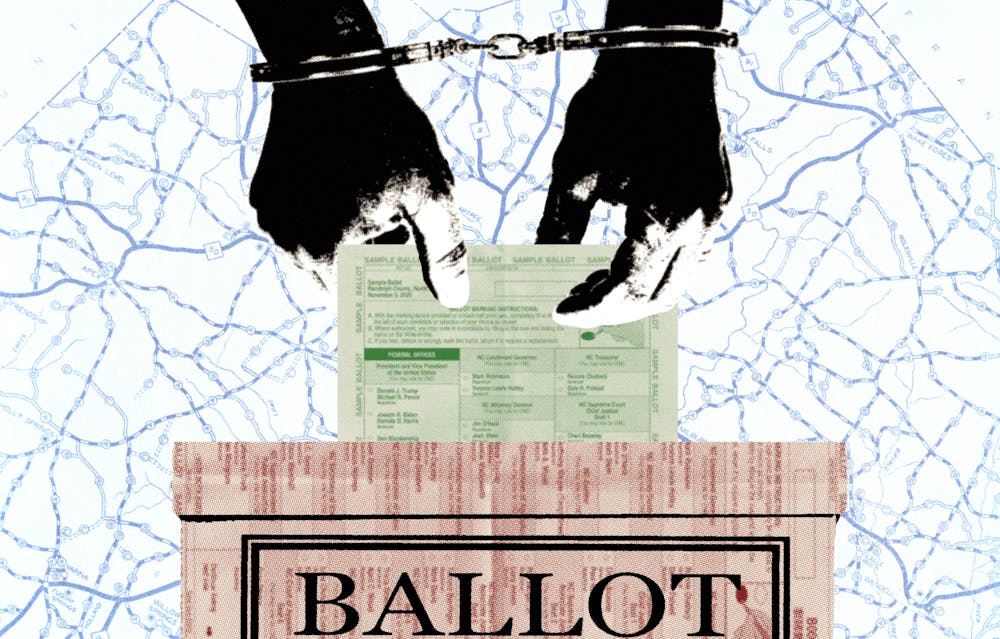“If we really believe in democracy, then we should support as many voices being able to be heard as possible,” Thompson said. “It really makes us all better when we can hear from the greatest and the least of the people in every situation, and especially people that we don’t usually prioritize.”
Disproportionate impacts
People of color, especially Black people, were disproportionately denied their voting rights before the decision.
The court said the ruling in the 1970s to preserve the denial of voting rights "was itself independently motivated by racism."
According to evidence cited in the case, Black men make up just over 9 percent of the voting-age population in the state, but about 37 percent of those were denied voting rights because of parole, probation or post-release supervision.
While registered Black voters make up 21 percent of North Carolina’s total electorate, more than 42 percent of people previously denied voting rights because of a felony conviction were Black.
The number of Black individuals denied voting rights on community supervision relative to overall voter registration was three times as high as white individuals on community supervision under the statute.
Barbara Foushee, a Carrboro Town Council member andChapel Hill-Carrboro NAACP Executive Committee member, said the issue is more about racism in the criminal justice system than denying voting rights to people with felony convictions.
"Black folks are always disproportionately impacted about something," she said. "I think all that goes back to racism. I feel like that's at the root of a lot of our issues — driving while Black, sleeping while Black, walking while Black, jogging while Black, the list goes on and on."
Foushee said change only comes through electing representatives and judges who can fight for underrepresented communities, including people of color.
She said she has tried to use her network and a program through her church to promote political participation in the Chapel Hill-Carrboro community.
"Sometimes folks miss that opportunity to vote these folks in that can help effectuate the kind of change in the criminal justice system that we so desperately need," Foushee said. "I think it's all about elections."
To get the day's news and headlines in your inbox each morning, sign up for our email newsletters.
Voter confusion
Lack of education and confusion about eligibility also factored into the court decision. Even in states where voting rights were automatically restored upon the completion of a sentence, like North Carolina, voters and officials often don't understand voting restoration.
According to testimony from an N.C. Department of Public Safety official during the trial, some of the forms the DPS provides to people with felony convictions contradict one another. The official, DPS’s deputy director of community supervision, testified that she did not know if people under felony supervision could vote.
Kate Fellman, the founder and executive director of You Can Vote, a N.C. voting rights nonprofit, said the best way to spread the word about the rights of people with felony convictions is to interact with them directly.
"Every day we're out doing community work, we run into folks who tell us they can't vote," she said. "When you dig a little deeper, it's because of a misconception or preconceived notion that once you have a felony on your record, you can never vote again."
Education through partnerships with other nonprofits and community services is crucial to helping otherwise marginalized people understand what their rights are, Fellman said.
Echoing Fellman's sentiment, Thompson said Democracy N.C. works with places like food banks to register new voters and inform them of their voting rights.
Thompson added that a potential overturning of the decision by the N.C. Supreme Court would not only further confuse these new voters, but actively harm them.
"It would be painful for this population that already could feel like we as a society are mistreating them or giving up on them or that we don't care about their situation," Thompson said. "The reason why we have some of these nonprofits to engage with issues is because we don't always give them the services that they need to succeed."
@ethanehorton1
@DTHCityState | city@dailytarheel.com
Ethan E. HortonEthan E. Horton was the 2023-24 city & state editor at The Daily Tar Heel. He previously served as a city & state assistant editor and as the 2023 summer managing editor.



